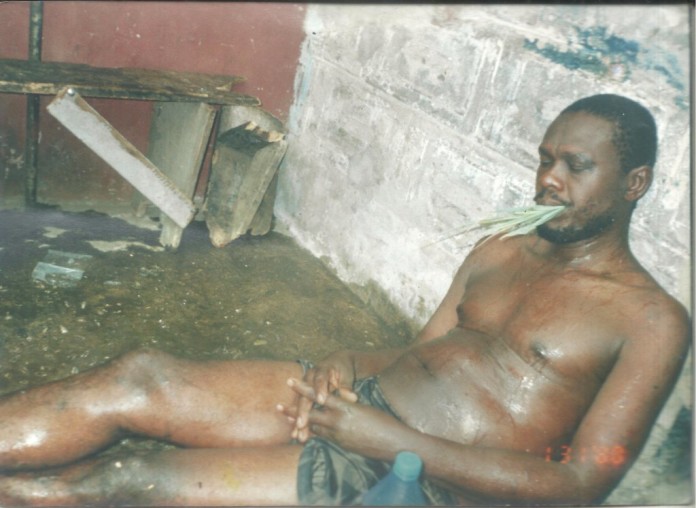He was dead. At least, so his kinsmen thought. Funeral arrangement had been prepared. Yet, he was feasting in the jungle with wild beasts. Hon Dimabo Oruama, a trained quantity surveyor of indisputable repute is a compendium of Shakespearean tragicomedy. A staff of the Rivers State Ministry of Works at the time, he cuts the virtue of mien personality.
Oruama had set out that fateful morning to supervise a renovation of a building project at Idama community in Akuku Toru Local Government Area of the state. Unknown to him though, it was a journey that would transport him out of human realm to a plane of deep thought.
Idama and Kula communities are two oil and gas producing areas. From the crucibles, they are not friendly. Yet, they are not at war.
The two communities had dispute over oil well that was in court at the time. Again, this was not enough vector to provoke war between them.
At the project site, four scruffy young men accosted him. Their mission was to take his life. His crime was that he was a total stranger who had no right to venture into Idama land being a Kula person.
The boys hectored him into explaining his mission. They jabbed the first punch. And this caused a deep cut on his left eye. Blood oozed out profusely and ceaselessly too.
Bathed in that ocean of blood, Oruama managed to locate a 97 year-old-chief and indented the incident. Armed with cudgels and other dangerous weapons, the four young men were still out there breathing hard down everybody’s neck. They hated peace. They wanted blood. They wanted to kill. And they must kill.
Oruama who is now a forced fugitive in a land of the unknown had to extract his own urine to clot the blood and stop the flow. He drank the same urine as “anti-bacteria. Anything at that point was good for me”.
In an attempt to save his life, Oruama, a virtuoso writer and a literary thinker scaled the kitchen window from where he was kept and landed in a creek.
He swarm 100 meters away into a mangrove for safety. Here, his odyssey began with excruciating experience, yet his moment of “transition” to a realm beyond the dream.
Oruama slept by the sea shore the first night on lemon grass. His bare body was swaddled by a legion of sandflies. A distance away was a cluster of straws. More like a save cave. But it was a den of wild wolves after all.
By 2am when the wolves returned home to roost, they could not enter their abode having perceived the aroma of a human being. A stranger to their animalistic world.
“Lord, save my soul”, he soliloquized. “I held two branches of a tree and shook them vigorously and the wild beasts scampered. I overcame the first danger. But the end of my ordeal was not at sight. That was just the beginning”, he narrated.
For four days, Oruama sojourned in the mangrove without food. He lived by drinking salt water. “When I saw mango, coconut and palm trees, I heaved a sight of respite”. He cut the mango leaves, perceived the natural aroma and ate it. “I drank the salt water with the help of a ragolis bottle, sometimes I lapped”.
Gaunt and stultified, Dimabo Oruama sighted a rain forest ahead of him. He pursued it thinking he would find his way out of the aimless journey to no destination. “On getting to the rain forest, I discovered it was a cemetery where dead children from Idama community were buried”.
In his sojourn in the forest, Oruama lived 80 percent of his life in the trance. Left with only boxers, he was a prey to icy cold of the sea and unfriendly insects of the evil jungle. In that strange environment, he was at the mercy of wild animals, but could not be hurt.
“One of such incredible moments was when I came face to face with a green snake that lives in the mangrove. I spoke to the snake. I did not come here to kill you. Don’t kill or harm me. I walked past the snake without hurt even when it cocked its head to strike”.
While roaming the lonely forest and the dangerous mangrove, a search team had been set up by the Idama people to look for Oruama and bring him back to his Kula people dead or alive. Completely gaunt and grotesque due to days of hunger and dry taste, Oruama wished himself dead but death refused to come.
One thing held him strong. He never thought of dead neither did he entertain any form of fear all through the period he spent in the forest.
He became a Nebuchadnezzar of some sort in fellowship with jungle beasts. The traumatized quantity surveyor was a man most miserable. “What have I done to deserve this? Why should I die inside this wild forest for trying to help somebody? Why should sister-communities not live in peace and harmony? A chain of questions neither the mangrove nor the fiery beasts could answer.
Back home, Oruama’s Kula community had concluded arrangement to wage war with Idama people for the “death” of their son. But the chiefs of Kula were wiser. They delayed the decision to declare a full-scale war believing that their son will definitely come back home.
Unfortunately, that faith soon caved in. Fourteen days after, hope gave way for despondency and faith to anxiety. Then canopies were set, tables put in their right places. The funeral of Dimabo Oruama was just about to kick-start. Then suddenly, they sighted a creature, tall and black from a closed range. He was like a spook in the dark.
Mortals scampered for safety. Relations denied knowledge of a man who had died or supposed to have died two weeks back. They missed it. It was their son, the missing father of three forced into the heart of the mangrove to increase his fecundity of life, though. “I have learnt a lot in that experience”, he told me.
Like the Ifa Priest in the great Ola Rotimi’s work: The Gods Are Not To Blame, Oruama’s solitary confinement in the heart of the jungle occasioned by the four assailants who wanted his life has projected him to a global stage.
Today, through one of his numerous “unputdownable” books: The Return of the Golden Sword which has been translated into French, Spanish and Chinese languages, Oruama is a revered voice in the literary world. A prolific writer, a flawless fiction teller, he dreams and preaches forgiveness and love.
He has spent over N37 million to stage performance of the book in Lagos, Port Harcourt and Rivers State Government House.
When the case was taken to court by the Abonnema police, Oruama instructed that the four men should be released and he worked out of the court.
Can you still love after 14 days sojourn with wild beasts? Can you forgive the four young men whose mission was to snuff life out of the innocent? Forgiveness is a virtue. We must cultivate it.
.Source: nigerianewsflight.com













